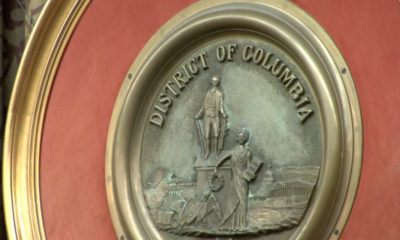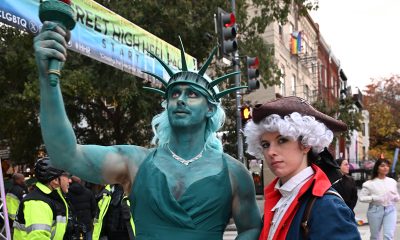Local
Vote on D.C. anti-bullying bill expected in fall
Fate of marriage ‘officiant’ measure unclear
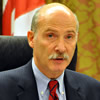
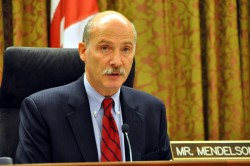
Council member Phil Mendelson chairs a committee overseeing the Marriage Officiant Amendment Act. (Washington Blade file photo)
Action on legislation pending before the D.C. Council that would prohibit bullying in the city’s schools, parks, and libraries, among other places, has been put on hold until the Council returns from its summer recess in September.
A separate bill of interest to the LGBT community that would allow a notary public to perform a civil marriage at a location other than the D.C. courthouse remains stalled in the Council’s Judiciary Committee since the panel held a hearing on the measure last October.
The Bullying and Intimidation Prevention Act of 2011 has strong support in the LGBT community following widely publicized incidents of gay teen suicides linked to school bullying. Nearly all Council members have signed on as co-sponsors or co-introducers of the bill.
But LGBT advocacy groups believe the bill as introduced doesn’t have adequate enforcement and implementation provisions. They are working closely with Council members to prepare one or more amendments to strengthen the bill, according to Rick Rosendall, vice president of the Gay & Lesbian Activists Alliance.
The bill requires the city’s public and charter schools, the Department of Parks and Recreation, the city’s public libraries, and the University of the District of Columbia to adopt “a policy prohibiting harassment, intimidation or bullying” in their respective facilities, buildings and grounds.
The legislation defines harassment, intimidation or bullying as “any gesture or written, verbal or physical act, including electronic communication, that is reasonably perceived as being motivated either by any actual or perceived characteristic, such as race, color, religion, ancestry, national origin, sexual orientation, gender identity and expression, or a mental, physical or sensory handicap, or by any other distinguishing characteristic.”
LGBT youth representatives joined officials from LGBT organizations, including the Gay, Lesbian & Straight Education Network, a national group that monitors anti-LGBT bullying, in testifying for the bill and for amendments to strengthen it at a Council hearing in May.
Meanwhile, supporters of the Marriage Officiant Amendment Act of 2011, which was authored by Council member Mary Cheh (D-Ward 3), say it’s aimed at giving couples – gay or straight – who are interested in a non-religious civil marriage the option of having such a marriage performed at a location outside the D.C. Superior Court building.
Under current city law, civil marriages must be performed at the courthouse by a court-appointed marriage “officiant” unless the parties getting married know a judge and the judge agrees to perform the marriage at another location, such as a banquet hall or a private home.
Backers of the bill say D.C. Superior Court judges, who are authorized to perform marriages under city law, do so only on a limited basis and are not available to most people seeking a civil marriage.
Council member Phil Mendelson (D-At-Large), who chairs the committee overseeing the bill, could not be immediately reached to determine whether he plans to move the bill out of committee for a vote anytime soon.
At the time of the hearing in October, Mendelson told the Blade he believed more research was needed on the bill and he had no immediate plans to call for a vote in committee or before the full Council.
“As far as I know, the notary bill will not be marked up,” gay activist Bob Summersgill told the Blade last week. “The bill is severely flawed and will need to be completely rewritten.”
Summersgill testified in favor of the bill at the October hearing. But he called for major changes that would allow any adult to perform a civil marriage by obtaining a one-day authorization to become a marriage officiant.
Massachusetts and some counties in California have similar one-day officiant laws that allow a couple planning to marry to select a friend or family member or anyone else of their choosing to perform their civil marriage. In Massachusetts the person seeking to perform the marriage must apply in advance and pay a $25 fee for the one-day authorization.
South Carolina, Florida and Maine have laws that allow a notary public to perform civil weddings.
Gay Council member David Catania (I-At-Large) and Council member Jack Evans (D-Ward 2) joined Cheh in co-introducing the D.C. Marriage Officiant Amendment Act last year. Gay Council member Jim Graham (D-Ward 1) and Council member Marion Barry (D-Ward 8) signed on as co-sponsors. Council member Tommy Wells (D-Ward 6) co-sponsored the bill last year but has not signed on as a co-sponsor this year.
Cheh told the Blade in an e-mail that she would consider the changes proposed by Summersgill to broaden the bill to include a one-day officiant provision similar to Massachusetts’ civil marriage law.
“I don’t know exactly why the bill hasn’t moved,” Cheh said. “Council member Mendelson has had a huge volume of stuff to move through his committee, and I have no reason to think he is opposed to the bill,” she said.
Steven Lowe, a D.C. resident who testified in support of the bill at last October’s hearing, said the bill as currently written provides couples seeking a civil marriage an option for having their marriage ceremony outside the courthouse. He describes the courthouse as “bureaucratic” and unappealing to many couples seeking a civil marriage.
Lowe said he doesn’t object to Summersgills’ call for a one-day officiant provision that would be available to all adults.
“But the point for me was to have something less restrictive and a non-religious option” in a location that people can choose, Lowe said. “So I supported the notary public bill because it was at least a move in the right direction.”
District of Columbia
Imperial Court of Washington drag group has ‘dissolved’
Board president cites declining support since pandemic
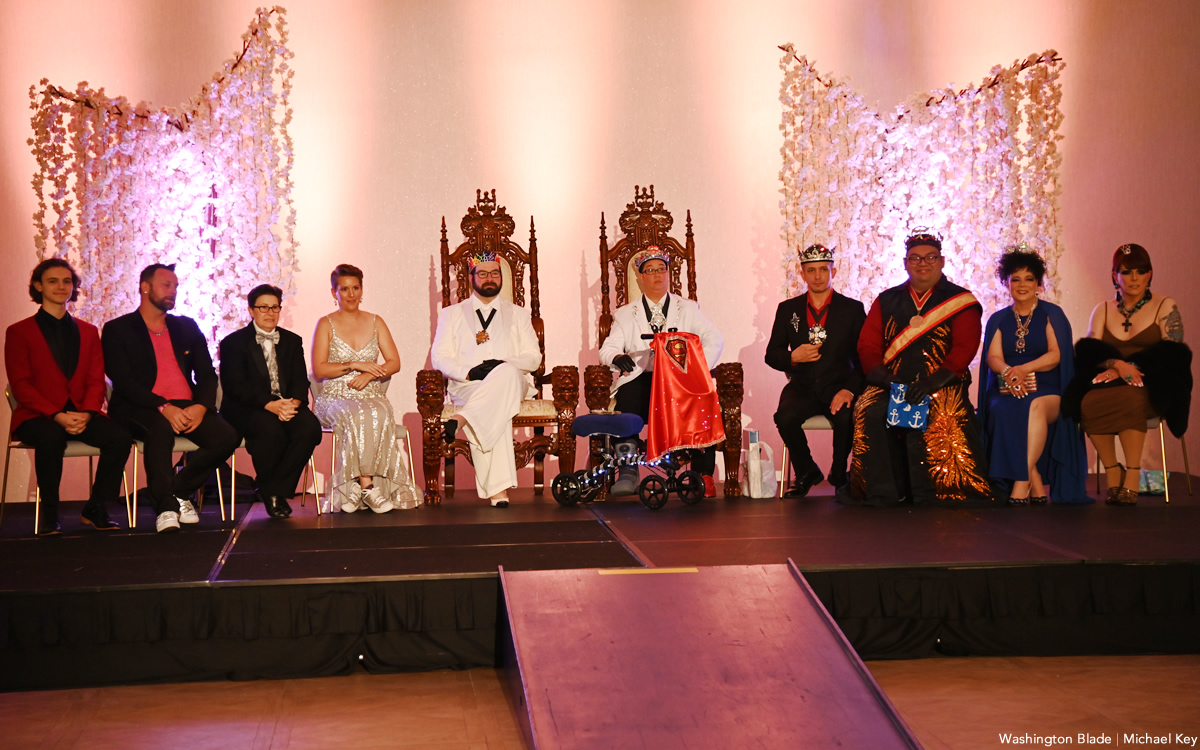
The Imperial Court of Washington, a D.C.-based organization of drag performers that has raised at least $250,000 or more for local LGBTQ and non-LGBTQ charitable groups since its founding in 2010, announced on Jan. 5 that it has ended its operations by dissolving its corporate status.
In a Jan. 5 statement posted on Facebook, Robert Amos, president of the group’s board of directors, said the board voted that day to formally dissolve the organization in accordance with its bylaws.
“This decision was made after careful consideration and was based on several factors, including ongoing challenges in adhering to the bylaws, maintaining compliance with 501(c)(3) requirements, continued lack of member interest and attendance, and a lack of community involvement and support as well,” Amos said in his statement.
He told the Washington Blade in a Jan. 6 telephone interview that the group was no longer in compliance with its bylaws, which require at least six board members, when the number of board members declined to just four. He noted that the lack of compliance with its bylaws also violated the requirements of its IRS status as a nonprofit, tax-exempt 501(c) (3) organization.
According to Amos, the inability to recruit additional board members came at a time when the organization was continuing to encounter a sharp drop in support from the community since the start of the COVID pandemic around 2020 and 2021.
Amos and longtime Imperial Court of Washington member and organizer Richard Legg, who uses the drag name Destiny B. Childs, said in the years since its founding, the group’s drag show fundraising events have often been attended by 150 or more people. They said the events have been held in LGBTQ bars, including Freddie’s Beach Bar in Arlington, as well as in other venues such as theaters and ballrooms.
Among the organizations receiving financial support from Imperial Court of Washington have been SMYAL, PFLAG, Whitman-Walker Health’s Walk to End HIV, Capital Pride Alliance, the DC LGBT Community Center, and the LGBTQ Fallen Heroes Fund. Other groups receiving support included Pets with Disabilities, the Epilepsy Foundation of Washington, and Grandma’s House.
The Imperial Court of Washington’s website, which was still online as of Jan. 6, says the D.C. group has been a proud member of the International Court System, which was founded in San Francisco in 1965 as a drag performance organization that evolved into a charitable fundraising operation with dozens of affiliated “Imperial Court” groups like the one in D.C.
Amos, who uses the drag name Veronica Blake, said he has heard that Imperial Court groups in other cities including Richmond and New York City, have experienced similar drops in support and attendance in the past year or two. He said the D.C. group’s events in the latter part of 2025 attracted 12 or fewer people, a development that has prevented it from sustaining its operations financially.
He said the membership, which helped support it financially through membership dues, has declined in recent years from close to 100 to its current membership of 21.
“There’s a lot of good we have done for the groups we supported, for the charities, and the gay community here,” Amos said. “It is just sad that we’ve had to do this, mainly because of the lack of interest and everything going on in the world and the national scene.”
Virginia
LGBTQ groups to join Spanberger inaugural parade
Virginia Pride among more than 25 orgs to march in Jan.17 event
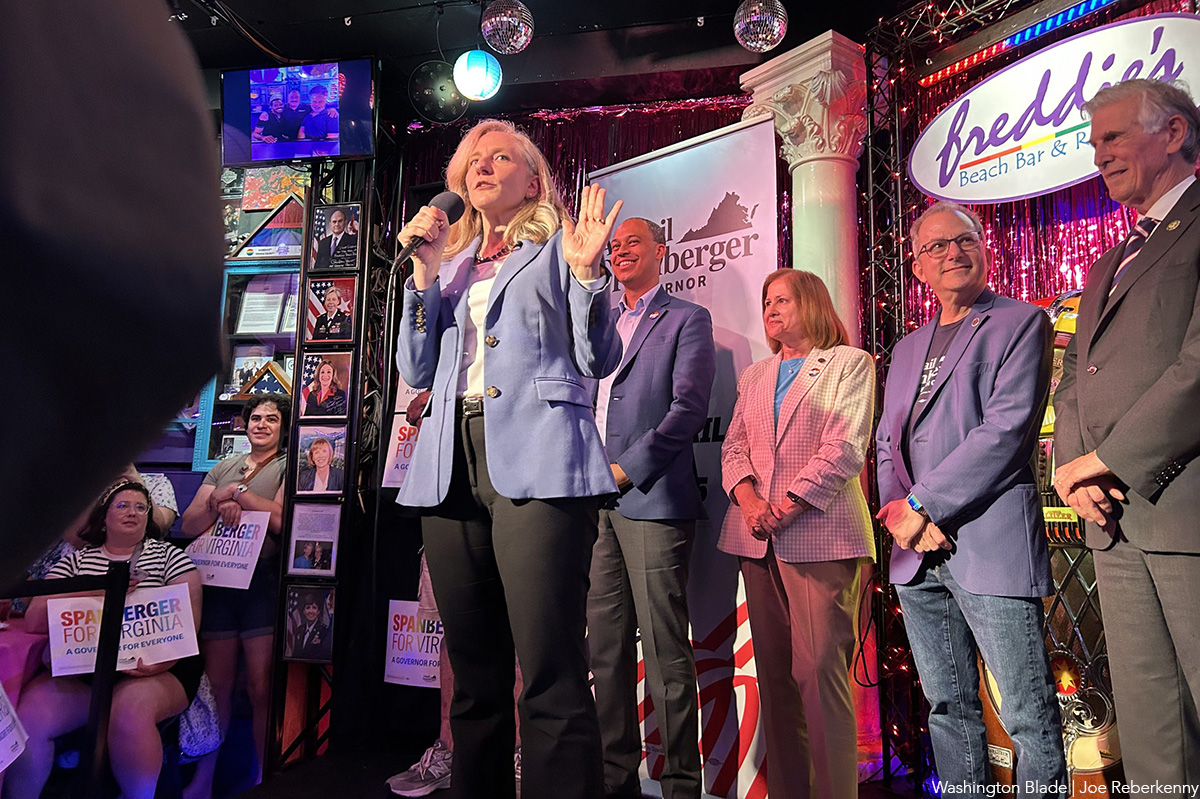
Virginia Gov.-Elect Abigail Spanberger’s inaugural committee announced on Jan. 2 that at least two LGBTQ organizations will be among more than 25 state-based organizations, including marching bands, that will participate in her inaugural parade on Jan. 17.
A statement released by the inaugural committee says the parade will take place immediately after Spanberger is sworn in as Virginia’s 75th governor and delivers her inaugural address in Richmond.
The statement lists the LGBTQ groups Virginia Pride and Diversity Richmond as two groups participating in the parade, although the two groups merged in 2021, with Virginia Pride becoming a project of Diversity Richmond. Among other things, Virginia Pride organizes Richmond’s annual LGBTQ Pride events.
“A display of the impressive talent and beauty of every corner of Virginia, our inaugural parade will be a celebration of all that makes our Commonwealth strong,” Spanberger said in the Jan. 2 statement. “I’m excited for attendees in the stands on Capitol Square and families watching together at home to see this incredible showing of Virginia pride,” she said.
James Millner, who serves as director of Virginia Pride, told the Washington Blade about 75 people are expected to join the Virginia Pride-Diversity Richmond contingent in the parade. He said among them will be members of other Virginia LGBTQ organizations.
“We’re going to invite our staff, our board, our volunteers, and our community partners to join us,” Millner said.
“We are thrilled and honored to have been invited to participate in Abigail Spanberger’s inauguration festivities,” he added. “I think this represents a marked change from the previous administration and demonstrates what she campaigned on – which is she sees the diversity of the Commonwealth as a strength that needs to be celebrated,” he said. “And we are very happy that she has invited us to represent the diversity of the commonwealth.”
Millner appeared to reflect on the sentiment of the large majority of Virginia’s LGBTQ community in its support for Democrat Spanberger over Republican Lt. Gov. Winsome Earle-Sears in the November 2025 Virginia election and the end of incumbent GOP Gov. Glenn Youngkin’s term in office on Jan. 17.
“After what we’ve been through with the Younkin administration, especially in its treatment of LGBTQ folks, especially transgender and nonconforming folks, I think we are all breathing easy and excited about what opportunities will exist in working with Abigail Spanberger,” he told the Blade.
District of Columbia
Two pioneering gay journalists to speak at Thursday event
Blade’s Chibbaro, Falls Church News-Press’s Benton talk long careers
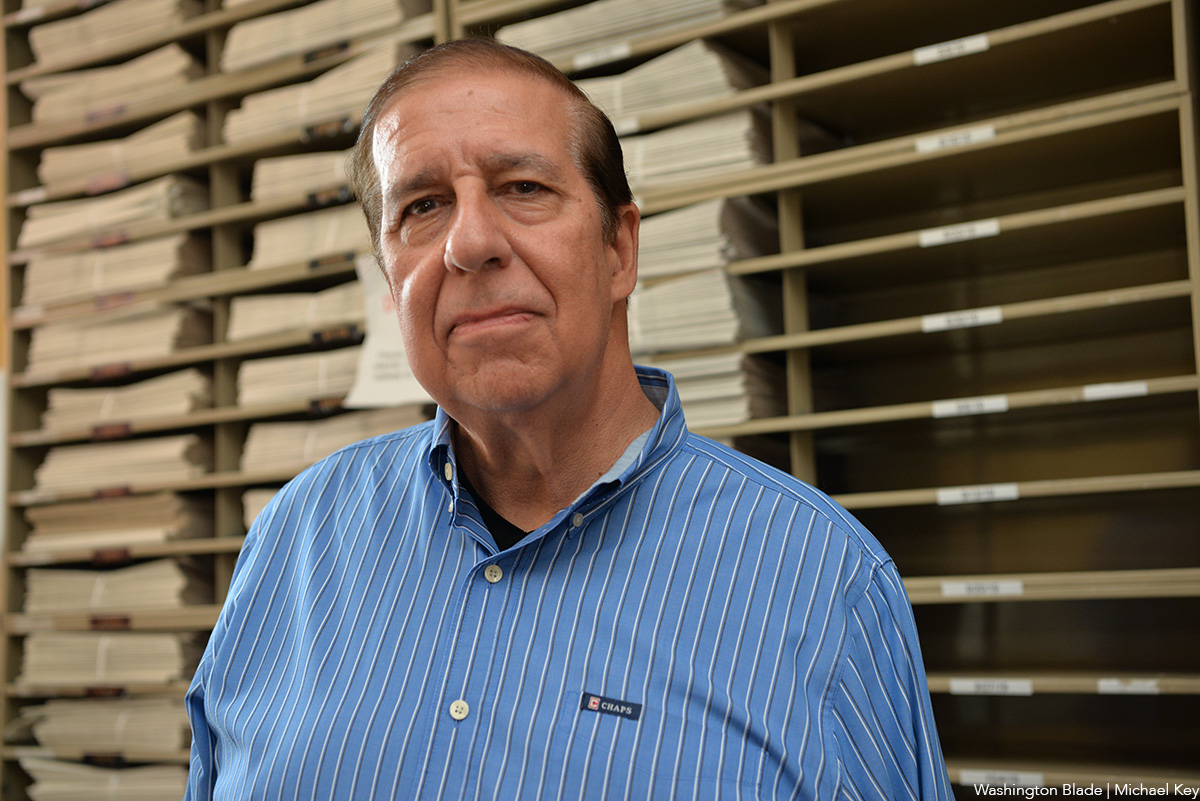
Two local gay journalists will speak on a panel this week about their long, pioneering careers.
A celebration of the Falls Church News-Press’s Nicholas Benton and the Washington Blade’s Lou Chibbaro Jr., two trailblazing LGBTQ journalists who have spent decades reporting on the front lines of social, cultural, legal, and political change in America, will be held this Thursday, Jan. 8, at the Women’s National Democratic Club of Washington. D.C., 1526 New Hampshire Avenue, N.W., at 6 p.m., according to a statement from organizers.
The program will explore their journeys, the evolution of LGBTQ journalism, and the ongoing fight for equality and justice. Benton and Chibbaro will also examine the various factors causing many news outlets to cease print publication and their energetic efforts to continue publishing their work both in print and online.
EVENT DETAILS:
- Remarks and Q&A, in-person and via Zoom.
- 6 p.m. complimentary hors d’oeuvres and cash bar; 6:30–7:30 p.m. program followed by book signing.
- Zoom only: $10. In-person: members: $20, nonmembers: $30 plus tax.
Benton’s latest book, “Please Don’t Eat Your Children, Cult Century, and Other Essays,” will be available for purchase at the event.
Benton is a longtime local journalist and LGBTQ rights activist whose work has had a lasting impact on both community journalism and social justice. Author of the first-ever editorial in the pioneering Gay Sunshine newspaper in 1970, he is best known as the founder, owner, and editor of the Falls Church News-Press, an independent weekly newspaper he launched in 1991 and is the paper of record for the City of Falls Church, Virginia.
Chibbaro is the senior news reporter for the Washington Blade and a pioneering journalist in LGBTQ news coverage. He has reported on the LGBTQ rights movement and community continuously since 1976, first as a freelance writer and later as a staff reporter, joining the Blade in 1984.

